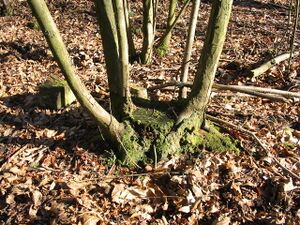Coppice
Jump to navigation
Jump to search


A tree coppice growing new shoots growing out from the sweet chestnut stool.
Coppice is the woody material that regrows from a tree or shrub stump or root after it is cut. The wood is typically cut on seven to twenty five year rotations and provide habitat for wild game and edible plants during their growth cycles. Coppiced wood can provide fuel, fiber, fodder, or mulch depending on the species and can dramatically increase a tree's life.[1]
Pollarding is used when there is concern that livestock or other animals will eat the tender new shoots.
Coppice forestry was extensively used throughout Europe since at least the Middle Ages. In medieval Europe, coppiced wood produced logs, poles, wattle, saplings, and brush for use in buildings, industry, and crafts.
References
- ↑ Jacke, Dave, and Eric Toensmeier. Edible Forest Gardens, Volume One. Chelsea Green Publishing, 2005. pp 4-5.